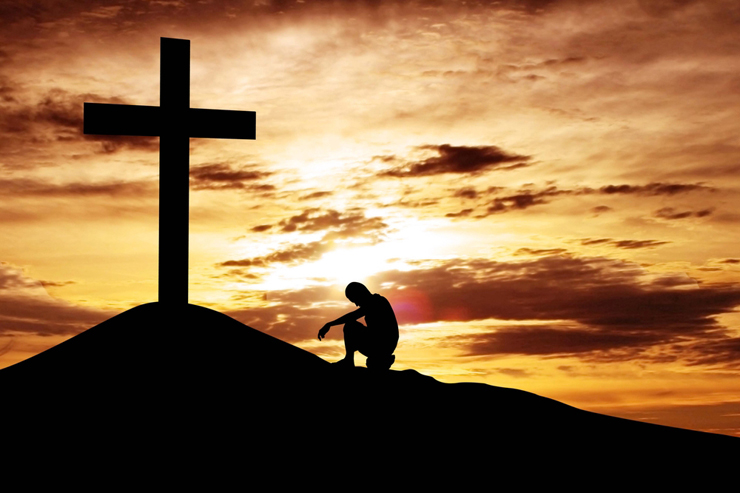
Elijah on Horeb by Daniele da Volterra
I have long loved the cycle of stories in the first book of Kings dealing with the prophet Elijah. In fact, I’ve often told people who are just getting interested in the Scripture to commence with the fascinating, adventurous, and often comical stories concerning this prophet. His name tells us all we need to know about him. “Elijah” is the Anglicization of the Hebrew Eliyahu, which means, “Yahweh is God.” People can be named from what they worship, what they hold to be of highest value. Thus, someone who values her work above all is a “company woman,” and someone who prizes his family above all is a “family man;” someone who seeks pleasure as his highest good is a “good-time Charlie,” etc. Elijah is a Yahweh man, for he worships the God of Israel. Once we know this, we know all we need to know about how he thinks and how he acts and reacts. Because he is a Yahweh man, he stands athwart the idolatry of King Ahab; because he is a Yahweh man, he is forced to flee the persecution of Queen Jezebel; because he is a Yahweh man, he seeks refuge on Horeb, the mountain of God.
While sojourning on Horeb, he hears that the Lord will be passing by. A mighty wind, an earthquake, and a devouring fire ensue, but the Lord, he knows, is not in those events. Then, he hears “a tiny, whispering sound,” and he knows that the true God is about to speak. What is this barely noticeable sound which Elijah finds infinitely compelling? It is, I submit, the voice of the conscience, that instinct of the heart by which we determine the difference between right and wrong. John Henry Newman referred to the conscience as “the aboriginal vicar of Christ in the soul.” Newman held, of course, that the Pope is the legitimate Vicar of Christ on earth, and yet he thought that the conscience is a more fundamental, a more elemental, a more interior representative of Christ. Now I realize that, as post-Freudians, we are all too willing to write off the conscience as the internalized voice of our fathers, as the inherited prejudices of our society, or as the bitter fruit of all of our irrational repressions and hang-ups. Nevertheless, try as we might to dismiss it, the conscience quietly but firmly reasserts its authority, rewarding us when we do something morally praiseworthy and rather sharply punishing us when we do something immoral.
A comparison might enable us to see the distinctive profile of the conscience more clearly. When I compose a column (which I do weekly), I usually have a sense, born of many years of experience, whether the piece is relatively good or relatively weak. My writer’s sensibility, accordingly, either “rewards” me or “punishes” me for my effort. Much the same could be said of a golfer’s inner sense that tells him whether he has swung smoothly or awkwardly. Now if I have written a less than stellar article, I might feel disappointed and regretful, and I might feel the obligation to get back to work and improve what I’ve composed. But my writer’s sense never makes me feel ashamed of what I’ve written. But the conscience, which accuses me of immoral behavior, produces precisely this sense of shame, the kind of feeling I have when I have hurt someone that I love. Concomitantly, when I perform an act of great generosity, forgiveness, or compassion, my conscience produces in me a feeling of satisfaction akin to that which I have when I have pleased someone that I love.
This is because the conscience is much more than a sensibility or a criterion of judgment; it is indeed the representative in us of Someone that we love. And this is why, Newman concluded, we refer quite rightly to the voice of the conscience, though we wouldn’t be tempted to refer to our aesthetic or athletic sensibilities as voices. It is the voice of Someone who is himself the final criterion of right and wrong and who is capable of probing the human heart in its deepest interiority and finding us wherever we are: “Lord, you search me and you know me; you know my resting and my rising. You discern my purpose from afar. Before ever a word is on my lips, you know it, Lord, through and through” (Ps. 139). In our culture, we have all been strictly trained to notice and deplore neurotic guilt, but we are often slow to appreciate the appropriate guilt which is the fruit of a robustly functioning conscience. The sense of moral desolation should not be automatically covered up, denied, or medicated, for it can be tantamount to a keenly felt experience of God.
Elijah could hear the tiny, whispering sound of God’s voice, even amidst the clamor of so many competing sounds, precisely because he was a man of Yahweh. His heart and mind and feelings were attuned, above all, to God. As has always been the case, people today (especially young people) hear myriad voices promising joy, peace, success, fulfillment. Sex, pleasure, ambition, political power, wealth — they all have avatars who shout in the public arena. But the only voice that matters is the tiny, whispering sound of the conscience, and you will hear it clearly if you become another Elijah, another man or woman of God.
Father Barron can be found on the Internet at:














